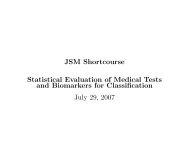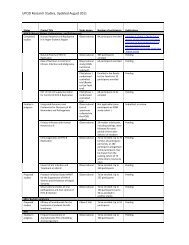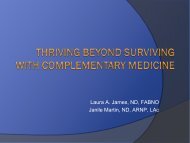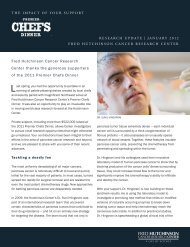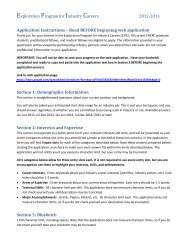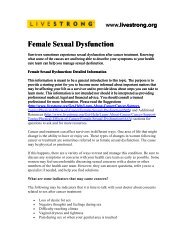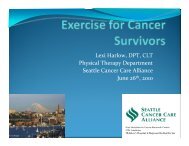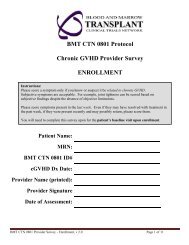Summer Undergraduate Research Program - Fred Hutchinson ...
Summer Undergraduate Research Program - Fred Hutchinson ...
Summer Undergraduate Research Program - Fred Hutchinson ...
Create successful ePaper yourself
Turn your PDF publications into a flip-book with our unique Google optimized e-Paper software.
Graduate School Personal Statement #3<br />
I want to pursue graduate studies in Molecular Microbiology and Immunology because I<br />
am fascinated by the interaction between host and pathogen, the idiosyncrasies of each<br />
relationship, and how knowledge of this interaction can be used to develop effective therapeutic<br />
interventions.<br />
My interest in infectious disease began with a high school field trip XXX, a non-profit<br />
organization dedicated to improving global health by finding solutions to the world’s most<br />
devastating diseases. I was impressed by their altruistic intentions, but mostly inspired to pursue<br />
a career as a physician-scientist on the cutting-edge of biomedical research. It was only after<br />
observing and talking to physicians specializing in infectious disease at the XXX Medical Center<br />
that I realized infectious disease was my calling. As a result of this experience, I applied to<br />
several summer undergraduate research programs, and was invited to join two competitive<br />
programs, at XXX and at the XXX. I elected to participate as a summer undergraduate intern at<br />
XXX, where I studied antifungal immunity in the lab of Dr. XXX. My experience working in an<br />
immunology lab full-time led to my current decision to study cellular and molecular immunology<br />
and host-pathogen interactions en route to a doctorate degree.<br />
Upon completion of my degree, I plan to pursue post-doctoral work to gain specialized<br />
experience in parasitology. Drawing from my undergraduate background in neuroscience, I am<br />
particularly interested in pathogens that are able to breach the blood-brain barrier, such as<br />
Toxoplasma gondii and Trypansoma bruceii. I find T. gondii to be especially interesting, as it is<br />
known to manipulate rat predator-evasion behavior in order to complete its life cycle, and more<br />
recently has been linked schizophrenia as an etiological factor. This microbe infects a<br />
substantial portion of the global population and is known to lead to fatal encephalitis in<br />
immunocompromised individuals; what could it be doing as it lies ‘dormant’ in a healthy host?<br />
As parasites and other infectious disease-causing agents are frequently an issue in developing<br />
nations, I want to work for a non-profit institute engaged in the development of affordable<br />
therapeutics and preventatives meant to be dispersed globally. Eventually, I want to teach at a<br />
university where I can offer undergraduate students the opportunity to engage in cutting-edge<br />
research, just as my mentors did for me.<br />
Over the past three years, I have been fortunate to work in two labs: Dr. XXX’ lab [XXX]<br />
on inhalant abuse and Dr. XXX’s lab [XXX] on antifungal immunity. I started in Dr. XXX; lab in<br />
February 20XX and ended in December 20XX. Dr. XXX has a very unique approach to the<br />
undergraduate lab set-up: instead of having students work on a single project, she assigns<br />
students to one of five student-led research ‘pods.’ With this configuration, her lab maintains a<br />
wide-ranging research focus. I led the research group investigating the potential use of<br />
Caenorhabditis elegans to study the effects of toluene, a common solvent in abused inhalants.<br />
We began with a behavioral study, measuring the effects of toluene exposure on worm<br />
locomotive behavior. We found that brief exposure to toluene decreased locomotive behavior,<br />
which led us to our next experiment where we compared levels of vesicular transporters before<br />
and after toluene exposure. In this phase of the project, I had the unique opportunity to learn<br />
how to operate a confocal microscope, which is capable of capturing very clear images of<br />
fluorescent transgenic worms. Although the learning curve was initially steep, we eventually<br />
found a significant effect of exposure on protein expression levels. The innovation and creativity<br />
behind this project earned us an internally-funded undergraduate grant from XXX, which<br />
28




